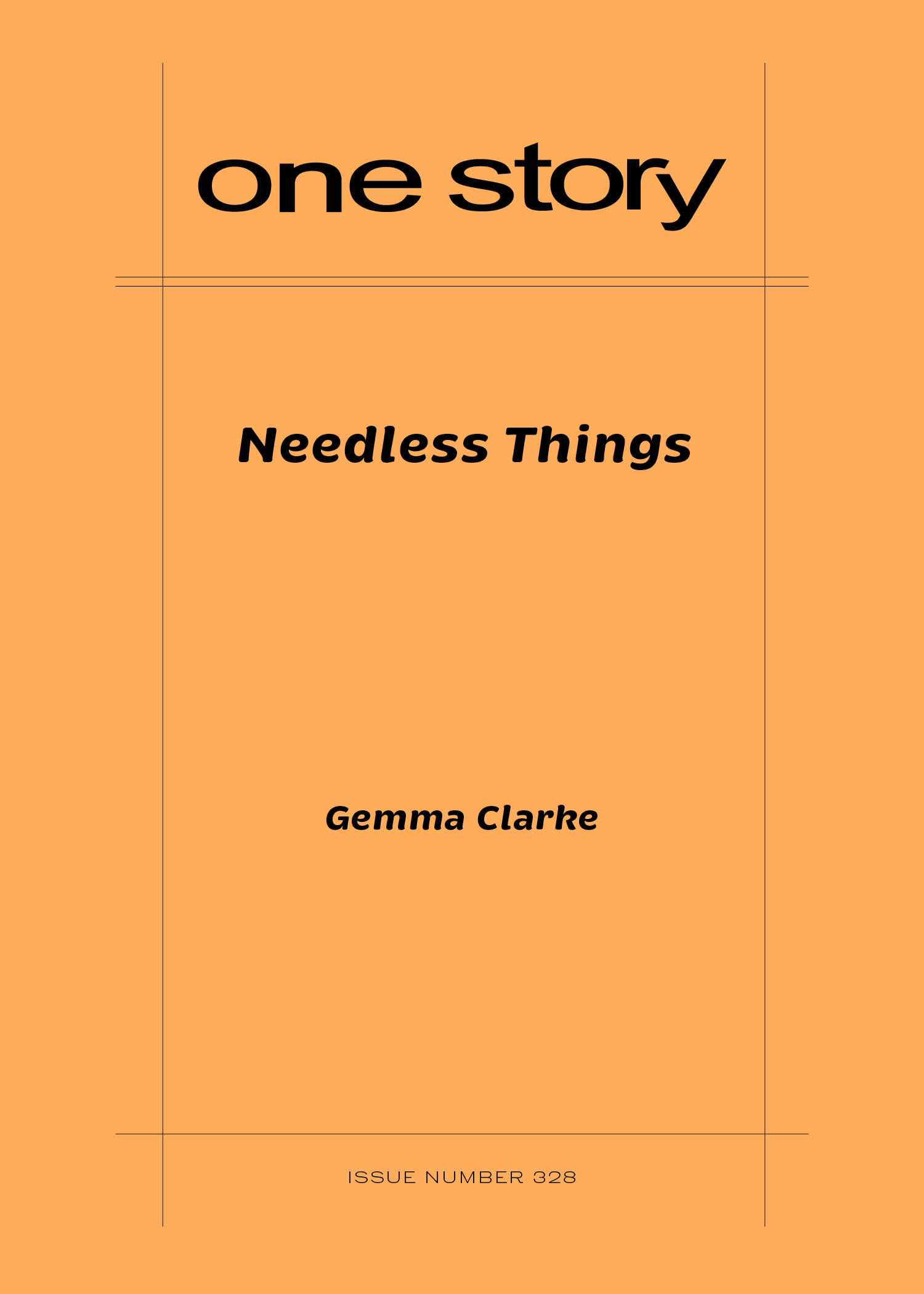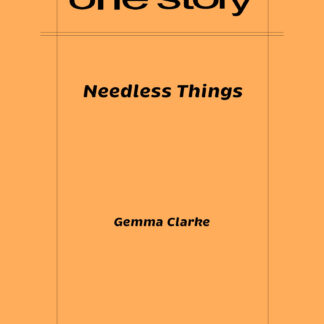
Needless Things
$2.50
81 in stock
Excerpt
It is mid-morning in the Snuggle Bunnies play café. The toy refrigerator has been ransacked, pretend vegetables strewn across the padded floor. A plastic potato lies on a wooden puzzle board, its eighteen pieces flung inside a fabric tent beside two dog-eared board books and a smattering of crayons.
Ela surveys the debris before beginning her twelfth cycle of the morning, moving counter-clockwise in ever-decreasing circles. She returns the vegetables to the tiny kitchen, roots on one side, alliums another. She gently fits the wooden pieces of the puzzle together to form a puppy in a kennel, its pink tongue poking from a lopsided smile. She places the books back on the shelves and the crayons in the tins in preparation for the next eruption. Children toddle around her on bandy legs, a mess of sticky fingers, runny noses, gummy mouths. Theirs is a language of shrieks, of feelings felt out loud.
Ela is tired. Back home, she could have been a math teacher. In America, this.
Gemma Clarke
Gemma Clarke was born in Khartoum and raised in Mogadishu and London. A former sportswriter who has written for The Guardian, The Times, The Daily Telegraph, and The Observer, among others, she holds an MFA in fiction from Sarah Lawrence College. She moved to the U.S. in 2010 and lives in New York with her husband and two children.
Will Allison on “Needless Things”
To be sure, Gemma Clarke’s “Needless Things” is topical. It’s the story of an immigrant, Ela, struggling to make it in the United States at a time when ICE agents are rounding up and deporting immigrants willy-nilly, with little regard for due process, never mind compassion.
But “Needless Things” doesn’t tackle federal immigration policy, choosing instead a more intimate focus: Ela’s day-to-day struggles and the indignities she endures in her low-wage job at Snuggle Bunnies, a shopping-mall childcare center where parents park their kids so they can shop in peace.
One day after lunch in the mall’s food court, Ela visits the kitchen store and finds herself in charge of Joji, a stranger’s runaway child. When Ela is mistaken for Joji’s mother by other shoppers, she’s haunted by thoughts of her own estranged child and fantasizes about kidnapping Joji, taking him back to the apartment she shares with other women from her home country. But will she be seen as a kidnapper regardless of what she does?
It’s a safe bet the story’s ending will surprise you (as it did me), and I’ll leave it at that. For now, get ready to enjoy some quietly gorgeous prose, first-rate storytelling that ranges from funny to fraught to heartbreaking, and a new voice in fiction you won’t soon forget.
Q&A by Will Allison
- WA: Where did the idea for “Needless Things” come from?
- GC: I was in a play space with my daughter when she was a toddler, and I was watching a woman who worked there. She kept tidying the space, only for the little ones to mess it up again immediately. Nobody seemed to notice her. She sparked my imagination and curiosity.
- WA: What was the hardest part of writing “Needless Things”?
- GC: Having the courage to finish it. I am guilty of starting things and losing faith in what I’m doing, writing a page or two and then casting it aside. A bit like a band playing the opening bars of one song at a concert, then taking an awkward bow and running away. I handed the first two pages of this story to Carolyn Ferrell, who I was lucky enough to study with. She spoke very gently but firmly and said, “Why are you giving me these lovely scraps? Finish it.” So, I did. So, thank you, Carolyn.
- WA: And what was the most rewarding part?
- GC: The surprises that came while I was writing it, a turn of phrase or an image I wasn’t expecting. That and the depth of feeling I developed for Ela and Joji.
- WA: Did you make any major changes between your earliest drafts and the finished story?
- GC: No major changes but lots of minor changes. I had one idea that involved robots but it didn’t come out on the page. Probably for the best.
- WA: The setting of this story—an American shopping mall—will be quite familiar to most of our readers, but I loved seeing it afresh through Ela’s immigrant eyes. Why did you choose to set the story in a mall?
- GC: When I first moved to the U.S. from London, I was thirty years old, so maybe this is embarrassing to admit, but I would get very overwhelmed and panicky in malls and megastores. I felt as though I should drop a trail of breadcrumbs so I could find my way out again. I thought there might be others like me who went into Wegmans for some yogurt and lost their way, fell into a chasm near the cereal aisle. But I also reasoned that it might not be a bad way to go. If I was going to be stuck in a retail environment in perpetuity, at least there would be flatscreen TVs and root beer. There’s something about a mall that’s surreal and alienating, which is how moving to a new country can feel too.
- WA: I also loved the fraught interactions between Ela and Joji, the boy she encounters at the mall. Did writing such a young character present any particular challenges?
- GC: I had fun writing him! I wanted to write a story with a cute kid as the antagonist because that’s how parenting can feel sometimes. Both Joji and Ela are acting on instinct in a way. There’s affection between them, but their relationship is also an awkward, corporate construct.
- WA: Was there a reason you chose not to name Ela’s home country?
- GC: Yes. I didn’t want to claim authority over a specific place. And I think we tend to make unconscious assumptions about other nationalities. For example, I was raised by British parents in Mogadishu and have seen the way Somali people contend with stereotypical notions about their homeland. We’re limited by what we’ve been exposed to. To name Ela’s country of origin might have added a layer of associations that didn’t serve the story.
- WA: Did you have to do any research for this story?
- GC: I think it’s been in my bones for a long time. My mum was the director for a charity that gave legal advice to immigration detainees. I heard so many stories over the years, all wrenching in their own way. Blaming immigrants for flaws in the immigration system is like blaming orphans for the state of the orphanage. As a society, we’re in this awful place now with the way immigrants are treated. The only immigrants who seem to be allowed to stay are “good” immigrants. They’re held to a much higher standard of behavior than birth citizens, which is truly weird when you think about it. It’s no longer just a citizenship test, it’s a worthiness test too. And that’s the best-case scenario. So, I was working out those feelings and ideas.
- WA: How long did it take you to complete “Needless Things”?
- GC: Six months of having only two pages, then a couple of weeks to finish the first draft.
- WA: What are you working on now?
- GC: I have completed a novel that I needed to put away for a while, but I’m back to peeking at it and editing again. I’m also partway through another longer piece of fiction.
- WA: What is the best bit of writing advice you’ve ever received?
- GC: I’ve inhaled vast amounts of writing advice over the years, searching for the one nugget that will unlock everything! Here it is… Just kidding. Here are a couple of things that work for me: Wake up before your inner critic (I think Marlon James was the source of this). Mine rises around 9 a.m., hungry for some earnest effort to chew on. I can usually write in peace if I get up before 5 a.m. Oliver Burkeman’s Four Thousand Weeks gave me the impetus to spend less time online. I deleted social media, and it has been wholly beneficial. Now I see those platforms as creativity thieves, harnessing our focus, even our dissent, and using them to further enrich despotic billionaires. Unplug from their mind-vacuums and free yourself to write! Also, finish that story.
